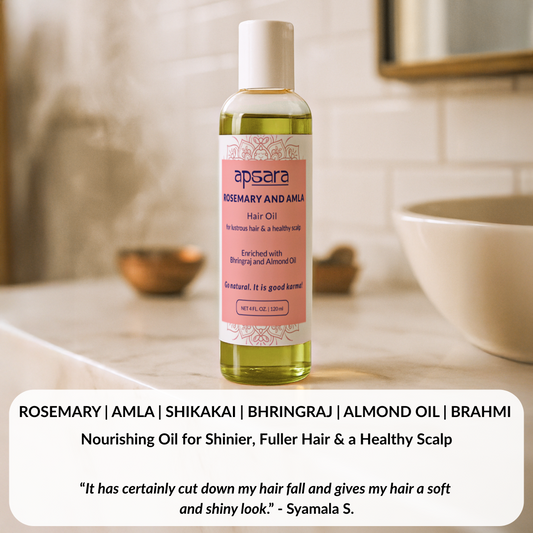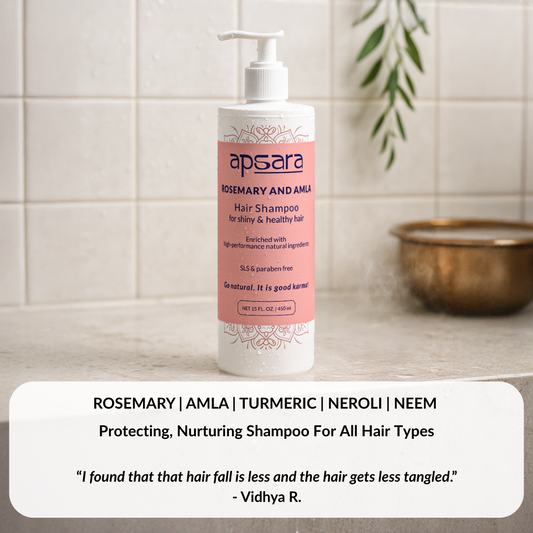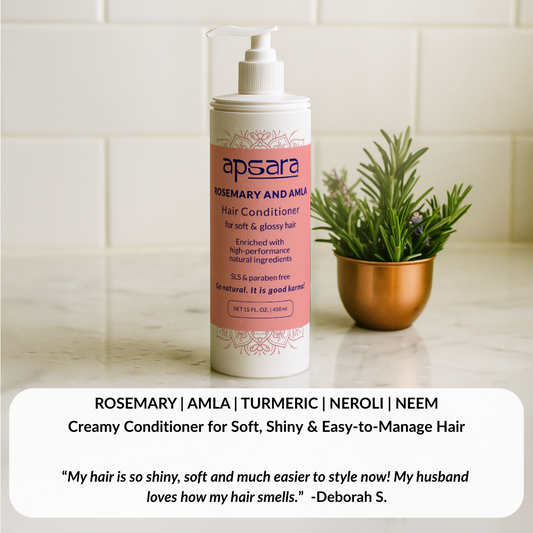
Above: Sheetal Rawal, scientist (human genetics) & founder of Apsara Skin Care
By: Marty S.
When we go to the salon to get our usual trim or touch-up, there is a temptation to try a new hair treatment. Sometimes, it works out for the better, and we walk out of the hair salon with a stunning new look. However, other times, that new hair treatment doesn’t meet our expectations, and our hair looks a bit of a disaster. Of course, that just means getting another hair treatment that can hopefully rescue us from our current hair predicament.
The above example notwithstanding, most of us don’t even think about how much damage hair treatments can do to our hair. All of those harsh chemicals and styling tools can take a toll on our hair. While your hair may look and feel fine, the health of your hair might not even show up as a serious problem until much later in the future, when you could be experiencing hair fall, thinning hair, early graying, et cetera. Fortunately, even for those who get frequent hair treatments, it is not too late to repair damaged hair. Keep reading to learn 3 tips that can help you mitigate and even reverse damage from hair treatments. We hope that with this information, even if you get a bad hair treatment, you know what to do to repair your hair so it can start looking gorgeous again.
1. Wash your hair only once or twice a week to prevent hair dryness.
For a lot of us, washing our hair is something we don’t even think about most of the time; we lather our hair with shampoo, wash it off thoroughly, and follow with our conditioner. And yet, this routine habit could be contributing to your hair damage for two reasons. First, depending on where you live, the tap water could be bad for both your hair and skin. Salts and chemicals are often added to water to make it safer and more potable, but when they come into contact with your hair and scalp, they can deprive them of natural oils that are intended to nourish and protect them. Second, the temperature of your shower or bath can affect your hair. If you use hot water to wash your hair, that can also eliminate these natural oils. When these oils aren’t present, your hair might be drier and coarser and it may start becoming more prone to hair breakage and hair fall.
While you shouldn’t completely stop washing your hair, you should only do it when it is visibly dirty or when you feel a lot of buildup in your hair. For many people, that is only about once or twice a week. And when you wash your hair, you must use warm water as opposed to hot, in order to prevent dryness.
Related: Tips to Eliminate Hair Fall, Dandruff, Early Graying
2. No harsh chemicals in hair care routine
Speaking of washing your hair, are you using a gentle and natural hair care routine? If not, you must seriously reconsider. Whenever we get a hair treatment, it exposes our scalp and hair follicles to a lot of harsh chemicals and heat that are not good for either of them. Chemicals like parabens and phthalates can irritate your scalp and dry out your hair. If these harsh chemicals are present in your hair care routine and you are washing your hair more than twice a week, that means your hair can be accumulating a lot of damage on a daily basis. This may result in hair breakage, early graying, and thinning hair.
Therefore, it is important to switch to gentle and natural hair care products. These products usually contain natural ingredients that have been known in the natural world for their hair-strengthening properties, for example, rosemary and amla. So, even if you get regular hair treatments, a gentle and natural hair care routine can mitigate some of the damage your hair has received and even start the repair process so that it can start looking lusher and thicker.
Related: Top tips to stop your hair from greying like crazy.
3. Use a hair oil for proper hair nourishment.
In addition to using your all-natural shampoo and conditioner, you should use a hair oil to nourish your hair and scalp. As we mentioned above, your scalp produces natural oils in order to nourish and protect itself and your hair strands. Without these oils, your hair can become more prone to dryness and brittleness. While you can rely on these natural oils for nourishment, you can use a hair oil, too. A hair oil typically is a great source of fatty acids that travel deep with your hair strands and your scalp to deeply nourish them. When your hair is adequately nourished, it is able to hold onto more moisture and looks thicker and fuller in appearance; similarly, a nourished hair scalp is good for your hair follicles and can lead to better hair growth.
As with your shampoo and conditioner, remember to use a natural hair oil. From jojoba oil to coconut oil, natural oils with rich fatty acids are easy to find, which means you can even prepare a DIY hair oil yourself with just a few drops of your favorite beauty oil.
FAQs
1. Does this mean I have to stop getting hair treatments?
If you are concerned about the quality of your hair, try to reduce the number of visits and try to use all of these tips so that your hair has a chance to recover. When your hair recovers, you will see little to no need of getting more treatments.
2. How do I know if my hair care products contain harsh chemicals?
Look at the list of ingredients for each product. If you see ingredients like sodium lauryl sulfate (SLS) or fragrance/parfum, those should be avoided.
3. Where can I find an all-natural hair care routine?
At Apsara Skin Care, we have an all-natural hair care routine comprised of three products: our Rosemary & Amla Shampoo, Rosemary & Amla Conditioner, and Rosemary & Amla Hair Oil.
4. What is the proper technique to oil my hair?
Gently massage the hair oil into your scalp and along the length of your hair. Leave it on for 1 to 2 hours or overnight, and then wash it off with warm water and follow with your shampoo and conditioner.







